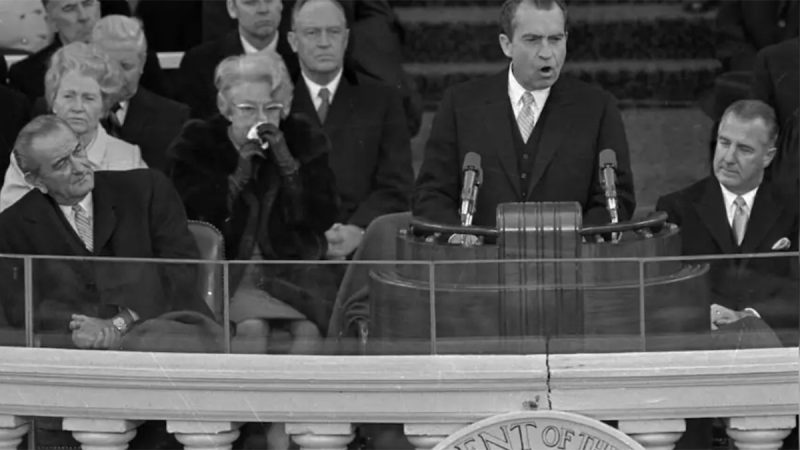Democrats are in trouble.
Influential Democrats – and the majority of voters — do not want Joe Biden to run for reelection. But history tells us that if the president decides to step aside, he needs to do so by year-end, and he has given no indication he is ready to do so. If he exits mid-way through the primary season, he will open his party up to massive infighting, a raucous convention and pave the way for the reelection of Donald Trump.
How do we know? Because the presidency of Lyndon Baines Johnson, who decided not to run for reelection, offers hints of what may lie ahead.
The similarities between the presidencies of LBJ and Joe Biden are profound, oddly including the intrusions of wars, random Minnesotans and related Kennedys. Both were long-time powerful Democrat senators and both served as vice president before ascending to the Oval Office. They shared grand ambitions of being ‘another FDR’; as president, both passed significant legislation. But they both saw their party riven and their own fortunes sunk by conflicts overseas.
Like Biden, Johnson started his presidency with high public approval ratings, only to see his popularity nosedive because of the escalating Vietnam War. The United States sent hundreds of thousands of GIs to support the government of South Vietnam, which was fighting against Communists in the North. Young people across the U.S. were furious; a nationwide draft was extremely unpopular, as was the government that enforced it.
Americans soured on the war after the Viet Cong mounted the Tet offensive on January 30, 1968; that effort to topple the Saigon government failed, but punctured what one account describes as the ‘illusion of progress that the Johnson administration had been holding before the American public.’ In only a few weeks, support for the war cratered, from 50% believing the U.S. was moving towards its goals to only 33%. Some 49% of Americans thought we should never have intervened in the first place.
Declining backing for the war sank Johnson’s approval ratings. By March only 36% of the nation approved of the job the president was doing; 52% did not.
Today, hostility towards Biden’s support for Israel, according to a recent NBC survey, has driven his already-poor standing to the lowest point in his presidency. A stunning 70% of voters ages 18 to 34 disapprove of his handling of the war.
On March 12, 1968, a little-known senator from Minnesota, Eugene McCarthy, stunned the nation by winning 42 percent of the vote in New Hampshire’s first-in-the-nation Democrat primary; LBJ got 48 percent. The shockingly close results encouraged Robert F. Kennedy, brother of the slain president John F. Kennedy, to jump into the race, further challenging LBJ’s path forward.
Coincidentally, another little-known Minnesotan has thrown his hat in today’s Democrat primary race; Congressman Dean Phillips is hoping to accomplish just such an upset in New Hampshire next January. Because of party infighting over the sequencing of its primary contests, Joe Biden will not be on the ballot in the Granite State, giving Phillips an unusual opening. If Phillips garners a large share of the primary vote, signaling Biden weakness, other Democrats are almost sure to declare their candidacy.
Weeks after the surprise near-upset in New Hampshire, President Johnson announced in a televised Oval Office address that he was offering to halt the U.S. bombing of Vietnam, in hopes of spurring peace talks with the Communists.
The president also dropped a bomb of a different sort – declaring he would not seek his party’s nomination for president — citing ‘division in the American house.’
In the wake of LBJ’s shocking announcement, two camps of Democrats scrambled for their party’s nomination. McCarthy and Kennedy ran against the war. Kennedy was assassinated in June; another anti-war candidate, Senator George McGovern of South Dakota, joined the race. Hubert Humphrey, LBJ’s vice president, represented the establishment wing of the party.
Also complicating the political scene for LBJ’s party was the emergence of a third-party candidate, Alabama Governor George Wallace, who appealed to southern Democrats and blue-collar workers, and siphoned off 5 states and 46 Electoral College votes.
Today, Biden and his colleagues fear that Democrat Senator Joe Manchin of West Virginia, who has announced he will not run to keep his seat, could play a similar role if he decides to mount a third-party centrist campaign.
Biden also faces Robert F. Kennedy, Jr., who is already running as an Independent, and in some polls securing as much as 22% of the vote, much of that coming from the Democrat side.
In August 1968, Democrats met in Chicago to pick their candidate. The gathering at the International Amphitheater was politically fractious, and also overwhelmed by anti-war rioting; delegates were met at the airport by National Guardsmen and the convention center itself was a virtual fortress. The day before the convention was marred by thousands of police attacking protesters with tear gas and clubs to remove them from Lincoln Park. Over the next several days, more than 650 protesters were arrested, and over 100 were treated at area hospitals. Some 192 police officers were injured, with 49 requiring medical treatment.
Inside the amphitheater, the situation was almost as unruly. Many delegates supported a so-called ‘peace plank’ which was ultimately defeated. Some delegates split with their party to join an anti-war vigil hosted by demonstrators. Because McGovern and McCarthy divided the anti-war vote, the party ended up nominating Humphrey, who went on to lose the Electoral College vote to Richard Nixon, 191-301.
The LBJ history tells us this: if Biden withdraws while the primary season is underway, those contests will reveal serious schisms, with progressives battling moderates and pro-Palestinian supporters fighting those who stand by Israel. At the least, Democrats will lose the enviable cohesion they have long enjoyed. The Chicago convention, meanwhile, will likely attract protests over Biden’s support for Israel.
History may not repeat, but it certainly does rhyme.






























